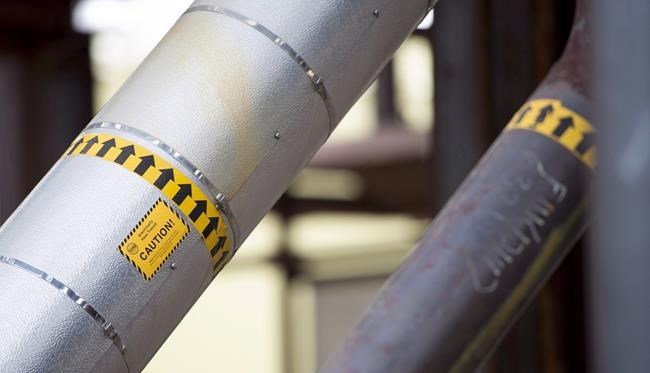CALGARY — The completion of the Coastal GasLink pipeline could be delayed if TC Energy cannot resolve an ongoing dispute with LNG Canada over project costs, the Calgary-based company said Thursday.
TC Energy chief executive François Poirier said construction of Coastal GasLink — which TC Energy is building to deliver natural gas from northeastern B.C. to the LNG Canada facility in Kitimat, B.C. — is nearly 50 per cent complete and making good progress after a delay earlier this year as a result of COVID-19 public health restrictions.
However, Poirier said his company is now in disagreement with LNG Canada over escalating costs and project scheduling.
“While commercial discussions are ongoing and we remain committed to successfully completing the project, we are nearing a critical stage that requires resolution of the outstanding issues,” Poirier told analysts on a conference call.
TC Energy was selected by LNG Canada in 2011 to design, build, own and operate Coastal GasLink. The 670-km pipeline is intended to move 2.1 billion cubic feet per day (bcf/d) of natural gas to LNG Canada's terminal, where it will be converted into a liquified state for export to global markets.
In an emailed statement, LNG Canada said TC Energy has proposed cost increases and schedule performance that are "well beyond" what the two companies agreed to when LNG Canada made its final investment decision in October 2018.
"We have been working hard with TC Energy to understand the reasons for the increase in cost and schedule, and we have provided recommendations on improved execution efficiency," LNG Canada said in its statement. "Our priorities are on a pipeline that is constructed safely and on schedule, under competitive terms, in order to deliver this critical infrastructure."
Preliminary construction on Coastal GasLink began in 2019, and the project is currently slated to be complete in 2023.
Also on Thursday, TC Energy reported lower net profits in its latest quarter as it continued to feel some effects from a large impairment charge that will be shared with the Alberta government on its cancelled Keystone XL export oil pipeline.
The company said its net income attributable to shareholders was $982 million or $1 per diluted share in the second quarter, down from $1.28 billion or $1.36 per share a year earlier.
The results included a $2-million impairment charge for Keystone while it recorded a $408-million gain in the prior year's quarter from the partial sale of Coastal GasLink LP.
Excluding one-time items, comparable earnings increased 21 per cent to $1.05 billion or $1.07 per share, from $863 million or 92 cents per share in the second quarter of 2020.
Revenues in the three months ended June 30 increased three per cent to $3.18 billion from $3.09 billion.
TC Energy was expected to post 96 cents per share in comparable earnings or $3.39 billion of revenues, according to financial data firm Refinitiv.
The company says the net financial impact on it from the Keystone XL termination was $1.1 billion as of the end of the quarter. It took an after-tax charge of $2.2 billion last quarter.
The Keystone XL expansion to an existing pipeline network would have increased Canadian oil export capacity by up to 830,000 barrels a day. It was suspended after newly elected U.S. President Joe Biden fulfilled a campaign promise to cancel its presidential permit.
TC Energy decided to start construction of Keystone XL in March 2020 after the Alberta government agreed to take a $1.5 billion equity stake and provide a $6 billion loan guarantee to ensure work started immediately.
This report by The Canadian Press was first published July 29, 2021.
Companies in this story: (TSX:TRP)
Amanda Stephenson, The Canadian Press




